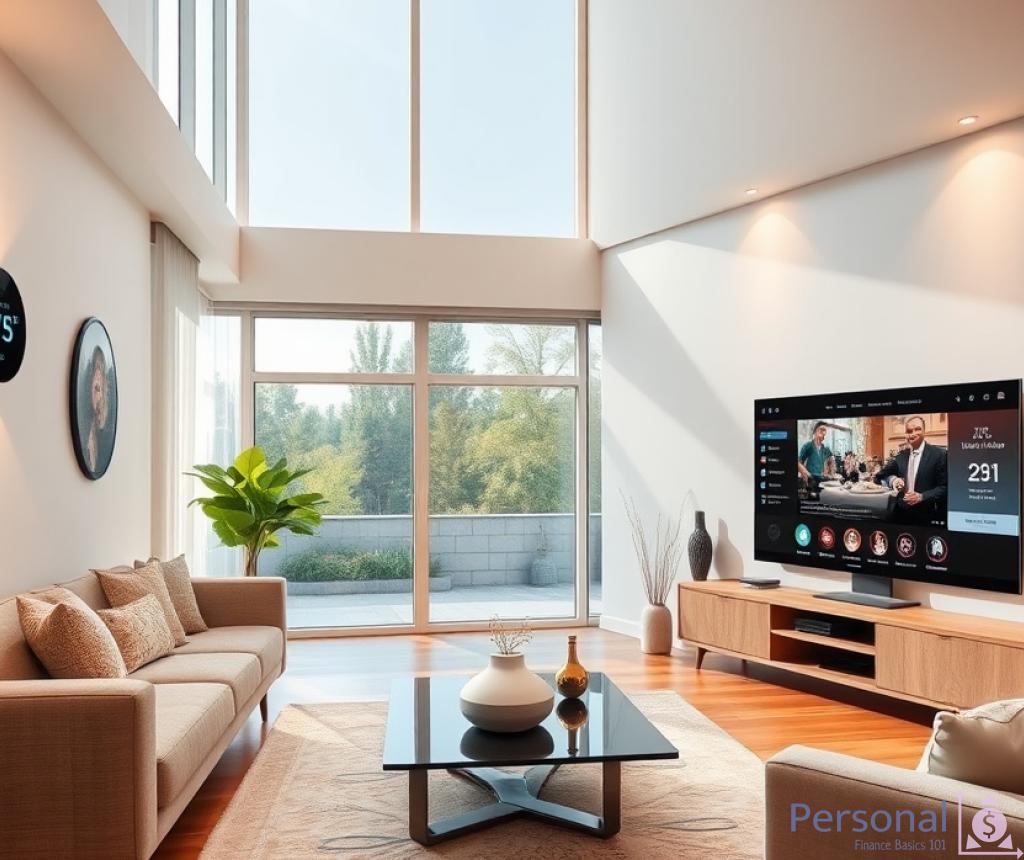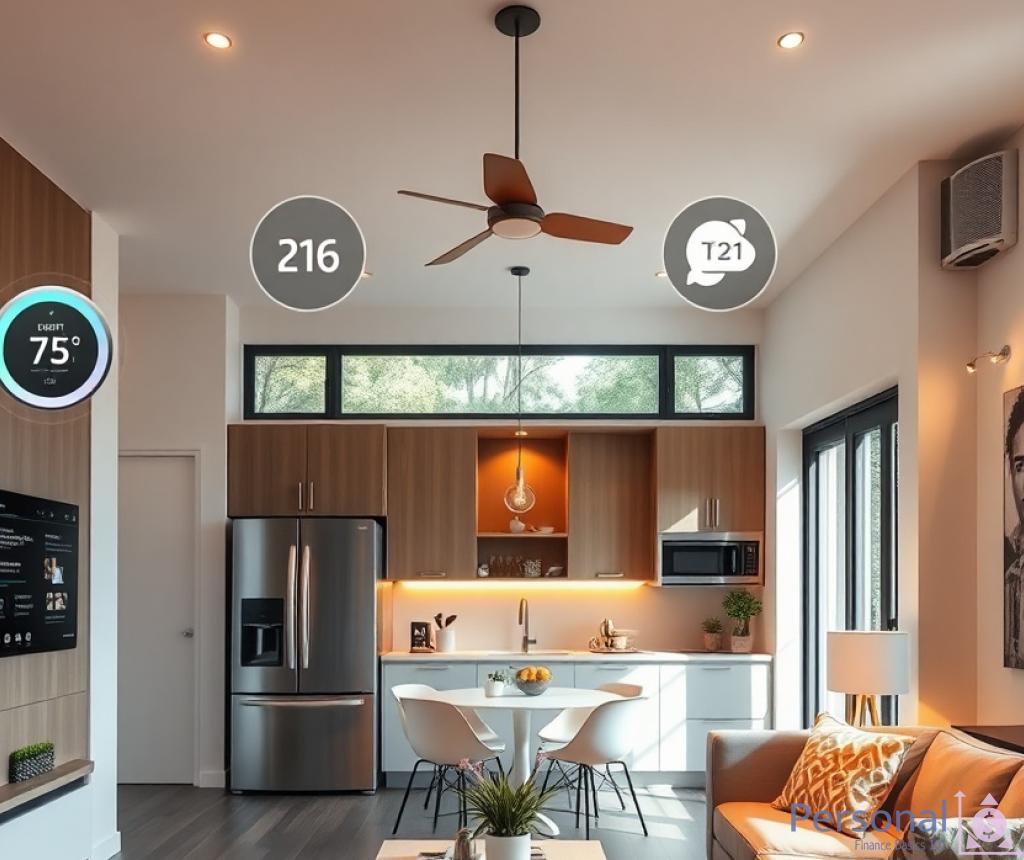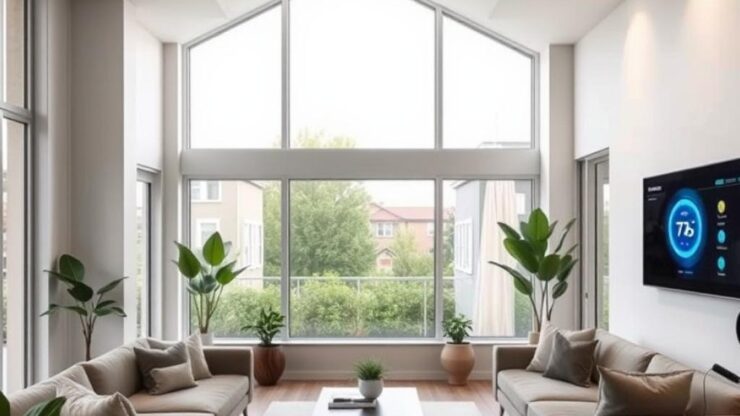The Rise of Smart Home Technology

The concept of smart homes has evolved significantly over the past few years, transcending from a futuristic idea to a common reality in modern real estate. This transformation is driven by advancements in technology that allow homeowners to control various aspects of their homes through integrated systems. The rise of smart home technology has not only enhanced convenience but has also improved energy efficiency and security, making it an enticing option for prospective buyers.
Smart home technology encompasses a wide array of features aimed at improving the functionality and comfort of living spaces. Below is a list of some of the most popular features that have contributed to the surge in smart home adoption:
- Home Automation: Control lighting, heating, and appliances remotely.
- Security Systems: Smart locks, cameras, and alarms that can be monitored via mobile devices.
- Energy Management: Smart thermostats and energy-efficient appliances that optimize consumption.
- Voice Assistants: Devices like Amazon Echo and Google Home that facilitate hands-free control.
- Smart Entertainment: Integrated audio and video systems that enhance home entertainment experiences.
The integration of smart home technology is reshaping the real estate market. Properties equipped with smart home features are increasingly viewed as more desirable, leading to higher property values and quicker sales. Real estate agents are now emphasizing these technologies as key selling points, recognizing that buyers are willing to invest in homes that promise enhanced lifestyles.
Moreover, the rise of smart home technology has prompted developers and builders to incorporate these features into new constructions. This shift highlights a growing trend where technology is not merely an addition but a fundamental aspect of modern housing design, catering to the needs of tech-savvy consumers.
Integration of IoT in Real Estate

The integration of the Internet of Things (IoT) into real estate is a transformative force that is reshaping how homes are designed, built, and experienced. IoT technology facilitates a seamless connectivity between devices, enabling homeowners to monitor and manage their living environments with unparalleled ease. This integration is not merely a technological upgrade; it represents a significant shift in the expectations and realities of home living.
At the core of IoT integration in real estate is the ability to create a cohesive ecosystem of smart devices that communicate with one another. This interconnectedness allows homeowners to control various systems—from lighting and climate control to security and entertainment—through a centralized platform. For instance, smart sensors can detect when a room is occupied and adjust heating or cooling accordingly, leading to enhanced energy efficiency and comfort.
Moreover, homeowners can receive real-time data about their energy consumption, enabling them to make informed decisions about usage patterns. This not only contributes to savings on utility bills but also promotes sustainable living practices. The data collected can also be leveraged to predict maintenance needs, ensuring that potential issues are addressed before they escalate into costly repairs.
The market response to IoT-enabled properties has been overwhelmingly positive, with studies indicating that homes equipped with smart technology command higher prices and experience faster sales. Buyers are increasingly prioritizing smart home features, viewing them as essential rather than optional. This trend is particularly pronounced among younger generations, who have grown up in a digitally interconnected world and expect their homes to reflect that lifestyle.
As developers and builders adapt to these changing preferences, we are witnessing a paradigm shift in how new properties are constructed. Modern buildings often feature embedded IoT systems from the outset, positioning them not just as living spaces but as smart environments that cater to the needs of their occupants. This shift not only enhances the appeal of new constructions but also establishes a benchmark for future developments in the real estate market.
Benefits of Smart Homes for Homeowners
As the landscape of modern real estate continues to evolve, the advantages of smart home technology for homeowners become increasingly evident. These benefits extend beyond mere convenience, enhancing safety, efficiency, and overall quality of life. Homeowners are discovering that investing in smart home features not only modernizes their living spaces but also provides numerous practical advantages that can significantly improve daily routines.
One of the most compelling benefits of smart homes is the unparalleled level of comfort and convenience they offer. Homeowners can easily control various aspects of their living environment from anywhere, using their smartphones or voice-activated devices. Imagine arriving home after a long day, only to find that the lights have automatically adjusted to a warm glow, the thermostat has set the temperature to your preference, and your favorite playlist is already playing. This seamless integration of technology into daily life allows for a more personalized and pleasant living experience, highlighting the value of smart home features.
The safety of one’s family and property is a primary concern for any homeowner, and smart home technology excels in this area. With the integration of advanced security systems, homeowners can monitor their properties in real-time through smart cameras, motion detectors, and smart locks. These systems not only allow for remote surveillance but also provide alerts in case of unusual activity. Furthermore, features such as automated lighting can simulate occupancy when homeowners are away, acting as a deterrent against potential intruders. By investing in smart security technology, homeowners gain peace of mind, knowing they have taken proactive measures to protect their homes and loved ones.
Smart homes are synonymous with energy efficiency, presenting homeowners with an opportunity to reduce their utility expenses significantly. Advanced smart thermostats, lighting systems, and energy-efficient appliances can be programmed or controlled remotely to optimize energy consumption. For instance, homeowners can set schedules for heating and cooling systems, ensuring they operate only when needed. Over time, these small adjustments can lead to substantial savings on energy bills. Moreover, many utility companies offer incentives for homeowners who utilize smart technology, further enhancing the financial benefits of such investments. The integration of energy-efficient solutions not only supports a homeowner’s wallet but also contributes to a sustainable future.
Challenges in Smart Home Implementation
As the enthusiasm for smart home technology continues to gain momentum in the real estate sector, it is crucial to address the challenges that accompany its implementation. While the benefits of smart homes are profound, the transition to a fully integrated living space is not without its hurdles. These challenges can range from technical issues and interoperability to security concerns and the initial cost of setup. Understanding these obstacles is essential for homeowners, builders, and investors alike as they navigate the evolving landscape of smart real estate.
One of the primary challenges faced in the implementation of smart home technology is the lack of standardization among various devices and systems. With numerous manufacturers and platforms competing for market share, homeowners may find it difficult to create a cohesive ecosystem that allows for seamless integration. For instance, a smart thermostat from one brand may not communicate effectively with a security camera from another, leading to frustration and inefficiencies.
This issue of interoperability can hinder the overall user experience, as homeowners often need to rely on multiple applications to control different devices. As a result, the promise of a fully automated home may feel more like a fragmented collection of gadgets rather than a cohesive system. This situation underscores the need for industry-wide collaboration to establish universal protocols that allow for smoother communication among devices.
Another significant challenge in the realm of smart homes is the heightened risk of cybersecurity threats. With an increasing number of devices connected to the internet, the potential for unauthorized access to personal information grows. Homeowners must be vigilant about safeguarding their networks and ensuring that their devices are equipped with robust security features. For instance, if a smart lock is compromised, it could lead to unauthorized entry, jeopardizing the safety of the household.
Moreover, as smart home devices collect vast amounts of data about users’ habits and preferences, there are growing concerns regarding privacy issues. Homeowners may find themselves uncomfortable with the idea of their personal information being stored and potentially shared with third parties without their consent. This reality calls for greater transparency from manufacturers and the implementation of stringent privacy regulations to protect consumers’ rights.
In conclusion, while the integration of smart technology in homes presents exciting possibilities, it also requires careful consideration of the challenges involved. By addressing technological barriers and prioritizing security and privacy, stakeholders in the real estate sector can work towards creating an environment where smart homes truly enhance the quality of life without compromising safety or efficiency.
Future Trends in Smart Home Systems
The rapid advancements in smart home technology are continually reshaping the landscape of modern real estate. As consumers become more tech-savvy and eco-conscious, the demand for innovative solutions is escalating. This shift not only transforms the way homes are designed and constructed but also influences the features that homeowners prioritize. In this dynamic environment, understanding the emerging trends in smart home systems is crucial for both buyers and industry professionals.
Artificial Intelligence (AI) is set to revolutionize smart home systems by enabling a level of personalization that was previously unimaginable. By analyzing user behavior and preferences, AI can adjust various home settings automatically, creating a tailored living experience. For instance, smart thermostats can learn a homeowner’s daily routine, adjusting the temperature accordingly to maximize comfort while minimizing energy consumption. This not only enhances the quality of life but also significantly contributes to energy efficiency, aligning with the growing emphasis on sustainability.
As security remains a paramount concern for homeowners, future smart home systems will increasingly incorporate advanced security features. The integration of biometric authentication, such as facial recognition and fingerprint scanning, will provide an additional layer of protection for residential properties. Furthermore, the use of AI-driven surveillance systems can improve threat detection and response times, allowing homeowners to monitor their properties more effectively. With these innovations, residents can enjoy peace of mind knowing their homes are equipped with state-of-the-art security measures.
The rollout of 5G networks is poised to enhance the connectivity of smart home devices dramatically. With faster internet speeds and improved reliability, homeowners will be able to control multiple devices simultaneously without latency issues. This seamless connectivity will facilitate more complex interactions between devices, such as coordinated responses between lighting, security systems, and climate control based on real-time data. As smart homes evolve into interconnected ecosystems, the role of 5G will be pivotal in unlocking their full potential.
Disclaimer
This article has been created or edited with the support of artificial intelligence and is for informational purposes only. The information provided should not be considered investment advice. Please seek the support of a professional advisor before making any investment decisions.






